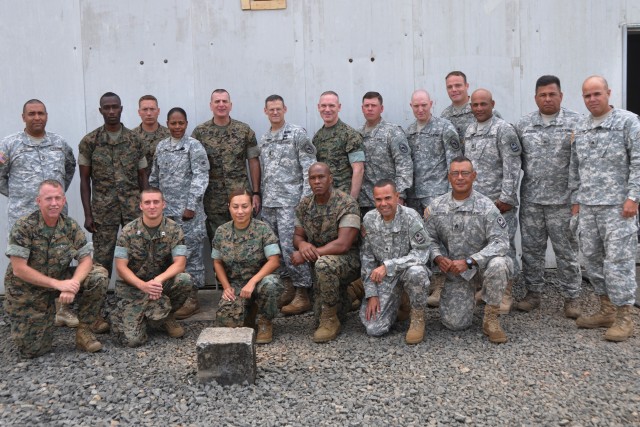
MONROVIA, Liberia - U.S. senior enlisted military leaders met with U.S. servicemembers working with Armed Forces of Liberia (AFL) soldiers November 23, 2009, at Camp Ware, Liberia.
A multiservice team of senior enlisted leaders from U.S. Joint Forces Command (U.S. JFCOM), U.S. Africa Command (U.S. AFRICOM), U.S. Naval Forces Africa and U.S. Marine Corps Africa engaged with military members serving as Liberian forces mentors and advisors to hear firsthand about the progress and issues they are encountering, as well as to provide advice and guidance.
"You're in a place where you can make a huge difference and each one of us is doing a little bit at a time; that's what this all about," said U.S. Africa Command senior enlisted leader, Command Sgt. Maj. Mark Ripka.
During the open discussion, mentor Sgt. Randy Acevedo, 1st Battalion 65th Infantry, noted that professional military education would be a great asset to the AFL.
Ripka said that although a noncommissioned officer academy would be a benefit, it's important to find ways to provide AFL soldiers with resources they need, but also ones they can sustain.
"We've got to make sure that when this is all said and done they can integrate into their particular region of Africa," said Ripka.
AFL soldiers need to be able to do everything on their own from growing their own food, to training their own soldiers, he said. Advisors must take this into consideration as they advise and mentor.
Good advising includes teaching others how to get the job done in a way that best suits the Armed Forces of Liberia rather than the trainer, said Ripka. One way he identified is breaking things down to the basic level. Hardcopy materials, like tactical aide memoirs with troop leading procedures and other checklists, would better serve the AFL than PowerPoint slides and online training and forms.
"It's not our way," said Sgt. Maj. Joe Leshinsky, senior enlisted advisor, U.S. Marine Forces Africa. "We just have to give them the tools and we have to be intelligent and flexible enough to understand what our experiences are and impart our experiences to them. We just tell them how we have done it and let them figure it out. And if they do something and it accomplishes the mission, and it isn't exactly how we do it ... then keep reinforcing the good practices they come up with by themselves."
Ripka told the troops that their job wasn't easy and there would be times they get frustrated because they don't see their impact immediately. He encouraged them to be patient.
"You're growing the roots," said Ripka. "People who come after us 5-7 years from now, if we're growing the roots the right way, are going to see it grow. We must be satisfied growing the roots and not being able to immediately see the impact of our efforts."
He added, "Like I tell our partners, we may provide you training assistance, but you give us another perspective on life."
The senior enlisted leaders met with servicemembers and Liberian forces during a two-day visit to Liberia preceding a trip to Djibouti to meet with military forces at Combine Joint Task Force - Horn of Africa.

Social Sharing